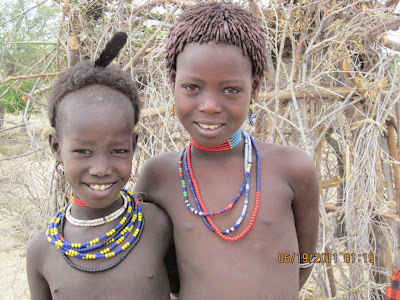
Last Week Barjo, This Week Goshpa
Goshpa in Hamar means “to cause to look beautiful, to adorn.” Women are adorned with butter and red ochre, iron rings on arms and legs and around the neck, with ostrich feathers, beads, etc., and men are similarly beautified with beads, bracelets, feathers, special hair dress and so on. *
Fascinating to me, the term goshpa has also received a metaphorical extension which pertains to the social domain: you may adorn someone by accepting her or him. You beautify others by expressing your liking for them. Furthermore, goshpa has a reciprocal element because it applies both to the host and the guest. The guest gains by the good things the host does for her/him and the host gains by the good sentiment s/he creates in the guest.
I am often invited to huts for coffee chaff (discarded coffee bean shells that are boiled repeatedly). I crawl into the hut (imagine - a 62 year old arthritic woman who barely fits through the opening which is a foot off the ground), sit on a cow hide and pretend to drink the coffee. After 15 minutes, I crawl out of the hut and off I go. Learning the concept of goshpahelps me understand the significance of the event. The Hamar host “beautifies” me by giving me coffee chaff and I “beautify” my host because s/he can tell others of my visit.
I marvel that a starving Hamar family gives away their last bit of sorghum (grain) when an unexpected guest shows up at their hut. However, this is a culture where all people know each other and they are willing to give away all they have. To be ready to give is held to be of great value. But you don't count the returns, you don't think like a merchant.
I wish I had understood goshpa when we first introduced CBLA (Community-based Learning in Action) in Hamar. Our behavior change consultant warned us not to provide coffee or incentives of any kind to motivate people to come to our training sessions. Giving incentives prevents sustainability. CBLA specializes in internal motivation. Hamar elders argued repeatedly that we had to provide coffee – there was no option. We finally agreed that when they come to a session we organize (our house) we provide the coffee. When the community organizes training (their house) they provide the coffee. This process would have been much smoother if I knew then what I know now. Providing coffee will not inhibit sustainability...it is only goshpa!
*excerpts from “Do the Hamar have a Concept of Honor?” by Ivo Strecker


